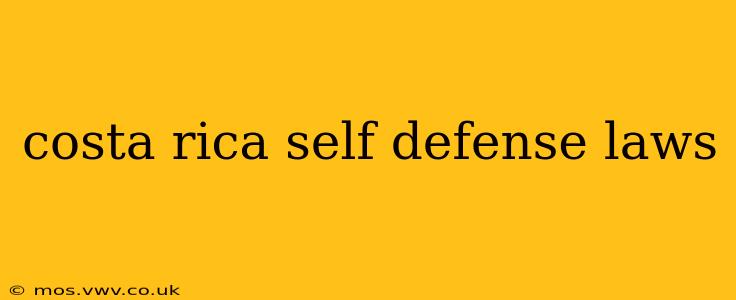Costa Rica, known for its "Pura Vida" lifestyle, prioritizes peace and non-violence. However, understanding self-defense laws is crucial for anyone living in or visiting the country. This guide provides a comprehensive overview of Costa Rican self-defense laws, addressing common questions and clarifying potential misconceptions. It's important to note that this information is for educational purposes only and should not be considered legal advice. Always consult with a qualified legal professional for specific legal guidance.
What are the laws regarding self-defense in Costa Rica?
Costa Rican law allows for self-defense, but it's strictly defined and requires adherence to specific principles. The key is proportionality. The force used in self-defense must be proportionate to the threat faced. This means you can only use the necessary force to repel an immediate attack. Excessive force, even if in the context of self-defense, can lead to criminal charges. The law emphasizes the concept of "legitimate defense" (legítima defensa), which is judged on a case-by-case basis, considering the circumstances surrounding the incident.
Can I use a weapon for self-defense in Costa Rica?
The legality of using a weapon for self-defense in Costa Rica is complex and heavily regulated. Generally, carrying firearms is restricted, requiring permits and strict adherence to regulations. Even with a permit, using a firearm in self-defense must still meet the proportionality requirement. Excessive force, even with a legally held weapon, could result in prosecution. Non-lethal self-defense tools, like pepper spray, are generally not permitted without specific permits. It's highly advisable to avoid carrying any weapon unless you are fully aware of and comply with all applicable laws and regulations.
What if I am attacked in my home?
While the proportionality principle still applies, the law generally provides more leeway for self-defense within one's own home. This stems from the right to protect one's property and family. However, this doesn't grant carte blanche to use excessive force. The threat must still be imminent, and the force used must be proportionate to the threat. The circumstances of the attack, such as the level of aggression and the presence of other people, will heavily influence the legal outcome.
What happens if I use self-defense and injure or kill someone?
If you injure or kill someone in self-defense, you will likely face an investigation. The authorities will examine the proportionality of your actions, the imminence of the threat, and the overall circumstances. Providing evidence, including witness testimonies, and demonstrating your actions were strictly necessary for self-preservation are crucial. Even if charges are initially filed, the courts will ultimately decide if your actions were justified under the concept of legitimate defense. A lawyer specializing in Costa Rican criminal law is highly recommended in such situations.
What should I do if I'm involved in a self-defense situation?
First, prioritize your safety and the safety of others. Once the immediate threat is over, contact the authorities immediately. Cooperate fully with the investigation, providing accurate details of the incident. Avoid making any statements or admitting guilt before speaking with a lawyer. Collecting evidence, such as photos or witness statements, can strengthen your defense. Remember, seeking legal counsel as soon as possible is crucial.
Are there specific situations where self-defense is not allowed in Costa Rica?
Self-defense is not justifiable if the initial aggression was provoked by the individual claiming self-defense. Additionally, retaliation is not considered legitimate self-defense. If the threat has passed, using force is no longer justified. These are crucial aspects to consider when determining the legality of self-defense actions.
This information is for general knowledge and should not substitute legal advice. Navigating the intricacies of Costa Rican law requires consulting a qualified legal professional who can provide personalized guidance based on your specific circumstances. Remember, prevention is always the best approach, so prioritizing personal safety and avoiding risky situations is highly recommended.
